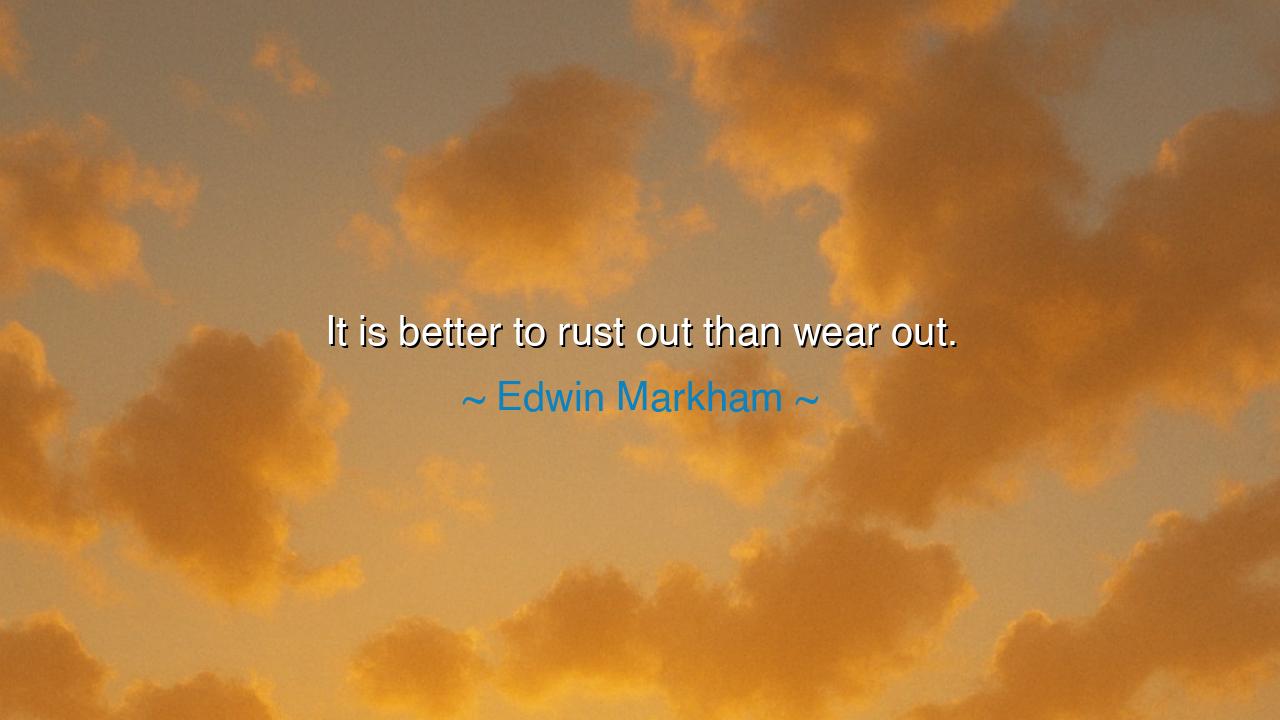
It is better to rust out than wear out.






Listen, O children of wisdom, for the words of Edwin Markham carry a timeless truth: "It is better to rust out than wear out." These words speak not of idleness, but of the danger of burning oneself too fiercely in the pursuit of life, only to be consumed by the very fire that once fueled the spirit. To rust, though slow and quiet, is a natural process—a gentle fading, a graceful yielding to time. But to wear out, to exhaust oneself through relentless, unchecked effort, is to lose the essence of life itself. Markham calls us to moderation, to find balance in our endeavors, and to recognize the cost of living too intensively without the wisdom of rest.
In life, many are driven by the desire to accomplish great things, to leave behind a legacy of action and achievement. Yet Markham warns that in the pursuit of greatness, one must not sacrifice the very vitality that sustains the soul. To wear oneself out is to pour all one's energy into a fire that consumes rather than nourishes. The balance of life, the true wisdom of living fully, lies not in burning the candle at both ends, but in knowing when to rest, to pause, and to replenish one’s spirit. Life is not a race to the finish, but a journey of sustained growth.
Consider the story of Leonardo da Vinci, whose life was filled with brilliant works of art and invention. Yet, in his later years, da Vinci struggled with a sense of fatigue and dissatisfaction, feeling that he had not completed all that he had set out to achieve. In his intense pursuit of perfection, he worked tirelessly, never allowing himself the rest his body and soul so desperately needed. The genius of his mind wore out his body, and even his work, though magnificent, was left incomplete. His example shows us the cost of overexertion, and the rust of inaction may indeed be gentler than the fierce wearing of relentless striving.
The wisdom of Markham’s words is echoed in the story of Homer, the ancient poet whose epic tales of war and heroism—The Iliad and The Odyssey—transcended the centuries. Yet, it is said that Homer was blind in his old age, a reminder that the passion that drives one to greatness can sometimes take a toll. Even the greatest of souls must remember that rest and reflection are as essential to the creative process as action itself. Homer's tales live on, not because he wore himself out in the search for glory, but because he found the balance between effort and renewal.
So, my children, remember this ancient wisdom: it is not in the exhaustion of one's spirit that greatness is found, but in the balance of action and rest. Let your work be meaningful, but do not allow it to wear out the very essence of who you are. Rusting out is not the same as idle abandonment, but a quiet and dignified yielding to the rhythms of life. Let the fires of your heart burn brightly, but know that they must be nurtured with care, that you may shine for all the years to come. In rest, find your strength; in work, find your purpose.






AAdministratorAdministrator
Welcome, honored guests. Please leave a comment, we will respond soon